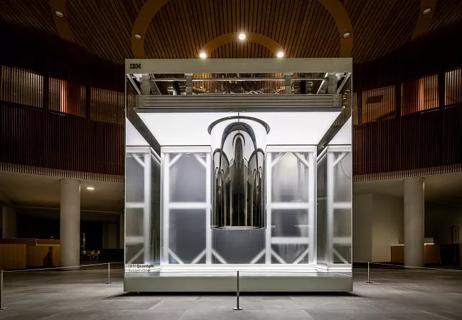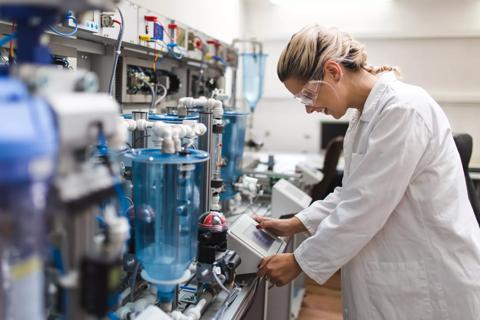As the U.S. has seen an increase in respiratory-related morbidity and mortality, supporting future respiratory researchers has become imperative

Written by Wayne Tsuang, MD, PhD
Advertisement
Cleveland Clinic is a non-profit academic medical center. Advertising on our site helps support our mission. We do not endorse non-Cleveland Clinic products or services. Policy
After being awarded a prestigious T32 training grant from the National Institutes of Health (NIH), Cleveland Clinic’s Respiratory Institute, in collaboration with Lerner Research Institute, developed an innovative program with the goal of supplementing the education of postdoctoral trainees with a research training curriculum. The program, “Supporting Multidisciplinary Achievement in Respiratory Research Training (SMARRT),” is specifically tailored for MD, PhD, or equivalent degrees in the areas of pulmonary, allergy or critical care medicine. It will support research in heart, lung, blood and sleep-related disorders. This curriculum helps give early scientists the ability to rapidly translate scientific discoveries into better ways to diagnose and treat disease.
While most NIH funding supports a specific scientist or small group of scientists, what makes this highly selective T32 grant special is that it supports an entire program of scholarship, mentoring and training. Ultimately, this $1.6 million multi-year grant will enhance the recruitment of early scientists who will become future leaders in their fields.
The U.S. has seen a 30% increase in respiratory-related morbidity and mortality over the past 20 years. This highlights a strong need for physician and scientist leaders to be in laboratories rapidly developing vaccines, in hospitals quickly facilitating clinical trials or in public health forums creating policies to guide communities. In response to this need the NIH, at the direction of the U.S. Congress, has long supported the training of early scientists to ensure we have a continuous pipeline of bright and capable investigators leading our nation’s medical workforce.
Advertisement
The NIH selects institutions that are ideally positioned and committed to advancing the biomedical research priorities of the United States. Given the long history of collaboration, the many shared resources and the mission of scholarship of the Cleveland Clinic, both the Respiratory Institute and Lerner Research Institute were ideally positioned to answer the call of training leaders and independent scientists.
Trainees are admitted to the T32 program for two to three years. The goal is to prepare them for independent career development grants such as K awards. K awards are 5-year, highly selective NIH grants that enable scientists to establish impactful and innovative research programs. The Respiratory Institute has supported a high number of K-funded physician-scientists who use basic, translational, clinical and population science methods to advance our understanding and care of respiratory diseases. Examples include a) studying metabolic abnormalities in pulmonary vascular disease, b) investigating the genetics of asthma, and asthma-related population health research, c) discovering novel therapeutic targets to halt the progression of fibrosis in patients with IPF or d) using novel databases to reduce differences in health outcomes in patients with sarcoidosis or undergoing lung transplant evaluation. On completion of these multiyear K awards, these early scientists are ideally positioned to become independent scientists.
The NIH’s T32 and K award training programs have three overarching end goals:
Advertisement
1) To provide early scientists with multidisciplinary research training, coupled to a team mentored research experience.
2) To enhance the ability of young scientists to work as part of an integrated, multidisciplinary team by developing a knowledge base and skills in research methods, communication skills, professionalism, the ethical conduct of research and rigorous analysis of reproducible findings.
3) To recruit, retain and accelerate the independent career development of a pool of early investigators with the multidisciplinary skills necessary for an independent research career in basic, clinical, translational or population health research.
Our clinician-scientists learn to work with each other, rely on each other for expertise, and use cutting-edge tools. Most importantly, trainees form mentor-trainee relationships to gain additional research experience needed to enhance competitiveness for subsequent large research awards.
As a recent example, Erica Orsini, MD, is a graduate of the Respiratory Institute’s Critical Care Medicine Fellowship Program as well as the T32 fellowship program. As part of her T32 training, she enrolled in the PhD program at the Lerner Research Institute, and she recently joined the faculty of the Department of Critical Care Medicine as both a clinician and a scientist. She continues to work with her longstanding mentor, Rachel Scheraga, MD, on translational work investigating the interaction between Pseudomonas aeruginosa virulence factors and immune cell mechanoreceptors to better understand mechanisms of lung injury during bacterial pneumonia. This could lead to better treatments for patients in the intensive care unit with severe infections.
Advertisement
Our hope is that the participants in these NIH programs go on to become leaders in their fields and in our nation’s scientist workforce. Through an environment of scholarship and mentorship here at Cleveland Clinic, they will have the knowledge and skills to recognize the importance of different research paradigms for rapidly translating scientific discoveries into better clinical diagnostics and therapeutics.
Advertisement
Advertisement

Initiative generates new ideas for improving efficiency, eliminating waste

Insights from Cleveland Clinic’s Vice Chair of Innovation and Technology

Cleveland Clinic launches Quantum Innovation Catalyzer Program to help start-up companies access advanced research technology

Lupus Clinic providers collaborate to advance treatment and understanding

New study sheds light on national trends in urology residency, former CCLCM alum comments

Ideation session generates solutions to medication administration errors

Caregivers spearhead changes that improve patient care, shape hospital culture

Findings could help clinicians make more informed decisions about medication recommendations